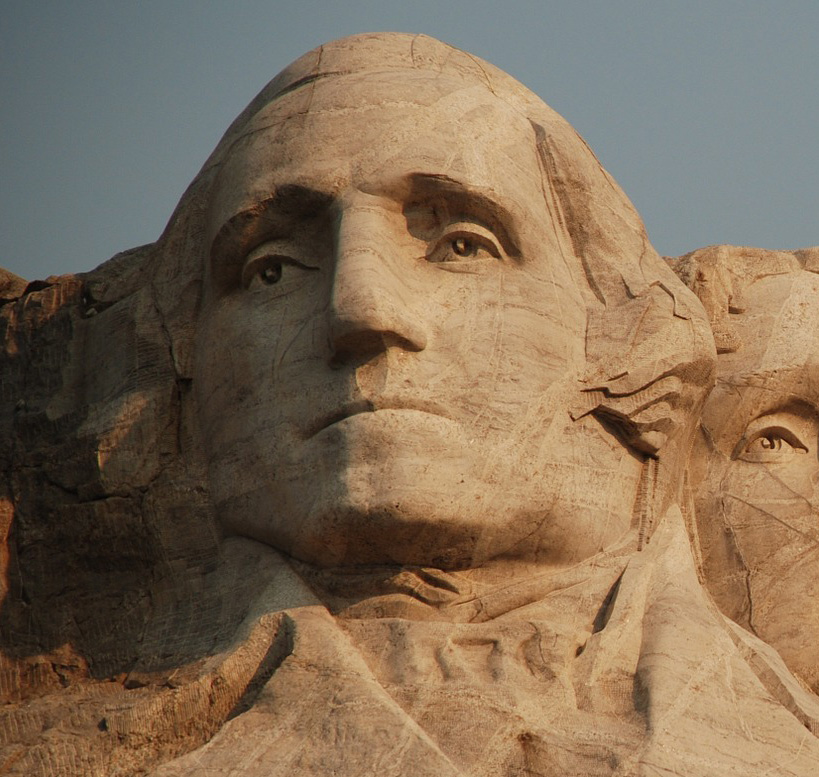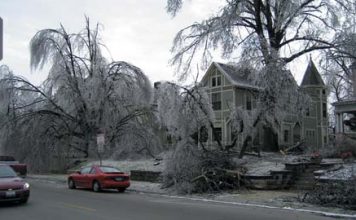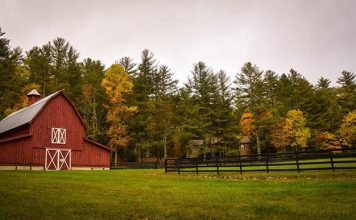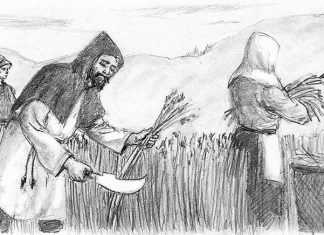 |
|
| Issue #49 • January/February, 1998 |
It was one of those days I love. We were between deadlines and Dave, Bill, Mac, and I had gone fishing on the lake. Dave, of course, is Dave Duffy, the publisher of Backwoods Home Magazine; Bill is Dave’s friend who drops in occasionally; and Mac is O.E. MacDougal, Dave’s poker-playing friend who lives down in Ventura, California, pretty near where I live.
We’d caught a slew of fish, mostly perch, but there were a few crappie in there, too. Dave filleted most of them with some help from Bill and Mac. TheyDave in particularhave the knack for that job. I’m clumsy, and none of them want to be near when I have a sharp object in my hand. They let me watch.
When they finished, three of us sat in the office drinking a little beer while Mac was in the little kitchen that is part of the office. He said he had a recipe he wanted to try and he volunteered to fry some of the fish for us.
Bill leaned back in his seat and out of the blue asked, “If you were to make up the greatest baseball team of all time, who’d you put on it?”
This is the kind of game I like. “Any players, living or dead?” I asked.
“Yeah.”
“By position?” Dave asked.
“We’ll go position by position,” Bill said.
“What position are we going to start with?” Dave asked.
Bill thought a second. “Let’s start with pitchers.”
“Left handed or right handed?” I asked.
“And what about relievers?” Dave asked.
“Okay, okay,” Bill said and thought a second. “We’ll do left and right handed starters, then we’ll go to the relievers, then we’ll do each of the infield positions…”
“I get it,” Dave said.
“Then start with the left handers,” Bill said.
“Who goes first?” I asked.
“I will,” Dave said. “The left hander has to be Sandy Koufax.”
“That one’s easy,” Bill said, “I’ll go with him, too.”
“Lefty Grove,” I said.
“Who?” Dave asked.
“Lefty Grove. He pitched for the Philadelphia Athletics and the Red Sox.”
“Never heard of him,” Dave said.
“He pitched back in the ’20s and ’30sI think even in the early ’40s. According to the baseball analyst Bill James, if you put Grove and Koufax side by side, Grove is clearly better.”
“I’ve never heard of Grove or this Bill James,” Dave said.
“Robert ‘Lefty’ Grove,” Bill said thoughtfully. “Hmm. I’ve heard he was good, but I’ll still go with Koufax. What about you, Mac, have you been listening to us?”
Mac was busy mixing up flour, corn meal, grated cheese, and a bunch of herbs and spices. “Babe Ruth,” he said without looking up.
“No, we’re doing pitchers, now. We’ll get to the other positions later.”
He looked up. “It’s still Ruth.”
“But…” I said and Bill cut me off.
“Oh, I see where you’re going. Ruth started out as a pitcher.”
“He wasn’t just a pitcher. He was a great pitcher,” Mac said. “While he pitched for the Red Sox, he was one of the most feared and dominating pitchers of his time. He set pitching marks that stood for decades and, though passed in modern times, he’s still the number two man on some of those records lists. He’d have made the Hall of Fame even if he’d never picked up a bat. He was so good that a hitter as great as George Sisler said he was making a mistake giving up pitching to become a hitter. Of course, no one knew that Ruth would turn into what many believe to be the greatest hitter of all time.”
“He was really that good of a pitcher?” Dave asked.
“Absolutely. Grove or Koufax may have been the best left hander ever in the conventional sense, but Ruth wasn’t that far behind, and imagine a great pitcher who is also the greatest hitter that ever lived. And if I pick Ruth as my left-handed starter, I can have Hank Aaron as my right fielder. Otherwise, Aaron’s off my team.”
Dave shook his head. “You always have a different way of looking at things. I’ve seen lists of all-time great teams, but I’ve never seen any sports writer put Ruth on his list as a pitcher. I’m going to go with your choice.”
“Me too,” Bill said.
I didn’t say anything. I was just wishing I’d thought of it.
“Are we ready to do right handed pitchers?” I asked.
“How do you do it?” Dave asked Mac. “How do you get these new angles on things?”
Mac dipped the fillets into a milk and egg mixture in a bowl. He then dumped part of his dry mixture in a shopping bag and threw in some of the fillets. He shook the bag, but he stopped and thought a second. “Lists like this depend on your criteria. It’s like asking who you think the greatest Presidents were; it all depends on what your criteria are.” He shook the bag a little more, then looked in and examined the results. He took the fillets out, placed them on a plate, then put in more and shook the bag again.
We watched in silence. The three of us must have been thinking the same thing. Finally, Bill said, “Okay, I’ll bite. Who do you think were the greatest Presidents?”
Mac stopped again. “I wasn’t trying to bait you when I said that. I just want you to realize that when some so-called expert makes up a listsuch as an all time best baseball team or a list of the greatest Presidents, you have to know what his or her criteria are.
“With baseball players we usually think of their batting prowess and fielding skills, though when we get to the mound position we usually just think of how well a player pitches without ever thinking of what else he may contribute to the team. In the case of a list of greatest Presidents, the list a person makes almost invariably depends on his basic political beliefs.”
He put the bag aside and dropped some fish in the frying pan. We could hear them sizzle as the smell of lunch filled the office.
“But who would you put on your list?” Dave asked.

One of the Founding Fathers of the United States, Thomas Jefferson was one of the first Presidents to go beyond the constraints imposed by the Constitution. But rather than increasing the power of the federal government, his intention was to get a European power off the North American continent and to expand the nation itself.
Mac didn’t think but a second and said, “Oh, I guess I’d take mostmaybe allof the first 15 Presidents and put them at or near the top…”
“Who was the 16th President?” I asked.
“Lincoln…and just a few of the postbellum Presidents from the 19th century like Arthur, Cleveland, McKinley…”
“Postbellum?” I asked.
“Postbellum means after the Civil Waror the War between the States, as it’s called in the South. Antebellum means before that war.”
“Oh.”
“…and I’d add a handful of the Republican Presidents from the 20th century.”
“Reagan, Bush…?” Dave asked.
“No, not them. Harding, Coolidge, Hoover…that’s it, though I’d put Ford higher on the list than any President since Hoover.”
“Ford?” Bill asked. “He was a do-nothing President. He was in the House of Representatives for 22 years and he never even introduced a bill.”
“What’s wrong with that?”
I think we were all a little startled by Mac’s response.
“If you want an activist President, you’re probably a Democrat,” he said, “although you may also be a modern-day Republican. If you want a President who leaves the people alone, you’re probably an old-time Republican, a 19th century Democrat, orand this is more likelya modern-day Libertarian.”
Bill said, “Most intellectuals think guys like Wilson and F.D.R. belong at the top. In fact, I’ve seen several lists where F.D.R. is at the very top.”
“Why do you think he’s there?” Mac asked without looking away from the pan.
“Well, he got us out of Hoover’s Depression…”
“I don’t know why people call it Hoover’s Depression,” Mac said. “Hoover was President for only three and a half years of the Great Depression while F.D.R. was President for eight of them, right up until the beginning of World War Two, when the Depression ‘officially’ ended. In fact, under Roosevelt, and in spite of all his programs, the Depression deepened. Five years into his Presidency, in 1938, it was worse than ever. You can’t blame that on Hoover; a Democratic President and Democratic Congress had been in power for five years. In fact, many economists have fielded strong arguments that show that F.D.R.’s meddling may have actually made the Depression worse.”
“So you base your criteria on how the country is doing economically,” Bill said.
“No, although I’ll admit I’m a financial conservative. But most of my criteria is based on the Constitution.” He started taking the fried fillets out of the pan.
Dave said, “Then your criteria is…” and he hesitated for a second.
“How closely a President adheres to the Constitution,” Mac said finishing Dave’s sentence for him.
“But I get the impression Lincoln’s not on your list,” I said.
He shook his head as he lifted some fish from the frying pan with a spatula.
“Come and get it,” he said as he took more fillets and dropped them into the hot oil.
“Why isn’t he on your list?” I asked.
“Lincoln was the first President to violate the Constitution wholesale. Before him, every President tried to live within its framework.
“What was different about the first 15 Presidents?” Dave asked.
“The first 15 Presidents all operated within the framework of the Constitutionwith a few, though noteworthy, exceptions.
“But more importantly, some of those Presidents are unfairly maligned today because they chose to act within the framework of the Constitution.”
“Name one,” Dave said.

Another of the Founding Fathers of the United States, John Adams’ name will forever be linked with the Alien and Sedition Acts.
“The one who stands out most is James Buchanan, the President who preceded Lincoln.”
“What did he do?”
“It’s what he didn’t do. He refused to act when South Carolina seceded from the Union. That secession was followed by the secession of the 10 other states after Lincoln was elected, and they went on to form the Confederacy.”
“Why didn’t he do something?”
“He said there was no constitutional basis for using force to keep them in the Union. And, actually, he was right.”
“So, what did Lincoln do?”
“He threatened military force to stop it.”
“But he had to,” Bill said.
“Why?”
“To free the slaves.”
“The Civil War wasn’t about slavery; it was about preserving the Union. It wasn’t about the Constitution and it wasn’t about freedom. And I’m not sure it was worth killing half a million people to keep the country intact just because some wanted to leave. Keep in mind that the South was not a foreign invader.”
“That’s how many died during the Civil War?” I asked.
“That’s the total,” Mac replied. “And after hundreds of thousands died to keep it together, there’s still nothing in the Constitution that says states can’t leave.
“The issue of slavery,” he added, “may have helped bring on secession, but it wasn’t the reason for the war.”
“I think you’re wrong,” I said. “Everything I learned in school said that war was fought to free the slaves.”
He crossed the office and picked up Bartlett’s Familiar Quotations and leafed through it. “Might as well quote Lincoln himself,” he said. “In a letter to Horace Greeley, editor of the New York Tribune, Lincoln wrote: My paramount object in this struggle is to save the Union, and it is not either to save or destroy slavery. If I could save the Union without freeing any slave, I would do it; and if I could save it by freeing all the slaves, I would do it; and if I could save it by freeing some and leaving others alone, I would also do that.
“Ending slavery was a noble purpose, but the war was fought over secession. Had the 11 states that made up the Confederacy not seceded, neither Lincoln nor the Congress would have sent troops into the South to end slavery. Slavery would simply have died its natural death as it did in other countries.”
“What about the Emancipation Proclamation?” I asked.
“The Emancipation Proclamation only freed the slaves in those states under control of the Confederacy. It did not free any of the slaves in the border states where the slaves were owned by Union sympathizers.”
“Really?”
“Yes, read it.”
“You say he violated the Constitution?” Dave asked.
“He tromped all over the very document that makes this country worthwhile and has made it different from any other country that has ever existed in history.”
“Give me some examples,” Dave said.
“In creating the state of West Virginia, he violated Article IV, Section 3 of the Constitution which says the federal government cannot form states from the jurisdiction of any of the states without the consent of the state legislature and the Congress.
“The taxes he levied to support the war, and the draft he imposed on the North were unconstitutional.
“The Writ of Habeas Corpus and the Bill of Rights were suspended. He summarily imprisoned critics and even had an arrest warrant written to jail the Chief Justice of the Supreme Court, Roger Taney, because he not only ruled that many of Lincoln’s actions were unconstitutional, he was also a vocal Lincoln critic.”
“But these things had to be done; otherwise, the United States wouldn’t be as it is now,” Bill said.
“Then you would have to say taking land from the Indians, breaking our treaties with them, and the kidnapping of Africans to bring them to this continent as forced, unpaid labor was okay because, without them, the United States wouldn’t be what it is today.”
He looked out at us for a response. No one responded.
“All you’re saying, Bill, is that the ends justify the means. I don’t feel that way. Today, most everything unconstitutional the government does, from illegal searches to asset seizures, is based on that concept. Bureaucrats and politicians are pummeling the Constitution, and they excuse themselves by saying they have a noble purpose.”
Bill and Dave thought about that one.
“Did he have him arrested?” I asked.
“Taney, the Supreme Court justice?”
I nodded.
“No. But even though the warrant was never executed, the fact remains that it is one more piece of evidence in the argument that Lincoln was nearly a dictator and the first President to flout the Constitution on a grand scale.”
“You said some of the early Presidents did violate the Constitution,” Dave said.
“Starting with the second President, John Adams. During his administration the Alien and Sedition Acts were passed by a Federalist Congress. Among other things, they made it illegal to criticize the government. The bill was signed by John Adams, a Federalist President, although he signed it reluctantlyand despite the fact that they violated the First Amendment to the Constitution. Historians have vilified him for that, as they should, but it’s interesting that many of those historians who put Adams low on their lists when they rank Presidents, and mention the Alien and Sedition Acts in their criticism of him, don’t seem to remember that one of their heroes, Woodrow Wilson, had more than 5,000 Americans jailed for speaking out against World War One. And, if you’ll recall, there were efforts to jail critics of the Vietnam War by the Johnson Administration, although that effort was quickly abandoned.
“Neither of those two Presidents is likely to be remembered for those things, at least not by contemporary historians.
“Jefferson was another who violated the constraints placed on the power of the federal government by the Constitution.”
“He helped write it, didn’t he?” Dave asked.

Although considered by many modern historians to have been a weak president, James Buchanan simply operated within the limits of the power granted the President by the Constitution.
“Actually, he was in France when it was written. But, other than disagreeing with the original versionbecause it didn’t have a Bill of Rightshe agreed with the constraints it imposed on the federal government. But as President, he violated it, or more accurately, he went beyond it.”
“What did he do?” Bill asked.
“There were no provisions in the Constitution for using public money to buy the Louisiana Purchase, and many people at the time pointed this out.”
“What do you mean?” I asked.
“The buying of the Louisiana Purchase from France was unconstitutional.”
“It wasn’t legal?” Dave asked.
“No.
“Then another who violated the Constitution was James Polk, one of the Presidents I otherwise admire, who unconstitutionally created a fifth cabinet office to go along with the Department of War, the Department of the Treasury, the State Department, and the Attorney General’s office.”
“Which one did he create?” Dave asked.
“The Department of the Interior.”
“Why?”
“To deal with all the land acquired during his administration. The United States annexed more territory during his administration than during the administration of any President before or since. But, by maintaining an Interior Department, this has led to federal ownership of almost 30 percent of the land in the United States. But the Constitution states explicitly that the federal government cannot own land other than the land set aside for the capital, Washington, D.C., and for forts, magazines, arsenals, dockyards, and other things which at the time were called ‘needful buildings.’ And all of this land was to be purchased from the states. The federal government has not paid for literally hundreds of millions of acres of land they now lay claim to.
“Now, I’m not saying that this is a good thing or a bad thing. But I am saying it is another example of the federal government ignoring the Constitution when it wants to.”

The last Democratic President to feel obligated to conduct the office of the presidency within constitutional limits, Grover Cleveland annoyed Democratic and Republican Congressmen alike with his insistence that congressional bills be in accordance with the Constitution of the United States.
“For the record,” Bill asked, “how do you feel about the federal government owning all this land?”
“I’m against it. The Founding Fathers had good reasons for not wanting the federal government to ‘own’ the country, and I agree with them.”
“I thought you’d feel that way. But, for my own edification, what were those reasons?” Bill asked.
“They feared a strong central government because they had already seen that historically wherever the government gained power it was always at the expense of the people.”
“What are some of the things early Presidents didn’t do because of Constitutional restraints that Presidents today would do?” Dave asked.
“One example is that, while he served in Congress, James Madison disapproved a $15,000 appropriation for French refugees, not because he was being stingy or cruel but because he could find nothing in the Constitution that allowed Congress to spend the public’s money for something charitable, no matter how well-meaning it was.”
“Why would he have to find permission in the Constitution for that?” I asked.
He looked at me surprised. “Anything the federal government does that it is not permittted by the Constitution is unconstitutional because all powers not given explicitly the federal government are reserved to the people or the states, according to the Tenth Amendment.”
“So Madison was just…” Dave hesitated. “…acting within the law.”
“That’s right. And other Presidents did the same. Franklin Pierce vetoed a bill to help the mentally ill on the same basis Monroe had voted against relief funds while in Congress. And Grover Cleveland vetoed several Congressional spending bills for the same reason, annoying both Republicans and Democrats.
“The Constitution isn’t an ironclad document,” Bill said. “It’s open to interpretation.”
“Even though we treat it that way, it’s not,” Mac said.
“Times are a’changing, Mac, and new problems need new solutions.”
“New problems?”
“Yes,” Bill said.
“And that means…?”
“We need to interpret the Constitution differently to meet modern problems. The Constitution is a living document.”
“First off, let me say I don’t think we have new problems, we just have new solutionsand they don’t work. We still have hate, poverty, national defense, violation of constitutional rights, etc. The same problems we’ve always had.
“Second, a constitution that’s open to interpretation is worse than a bad constitution that we stick to. A constitution with fluid meaning has no meaning at all. No citizen can now pick up our Constitution, which was written for the common man, and know what it means because its meaning keeps changing. And in the meantime any branch of Government can now wring an interpretation to its own benefit.
“It also means that the meaning of the Constitution can be changed by reinterpretation alone, which means that it is being amended without the consent of the people or the states. But if you read the Constitution, and the records of debates and what the Founding Fathers wrote, including the Federalist Papers, you will find that they meant the Constitution to be adhered to as strict guidelines.”
“That sounds good, but I don’t think it’s practical,” Bill persisted.
“Well, look at it this way, Bill. When laws and bureaucratic regulations are enacted, we, the citizens, are expected to obey the letter of the law. We are not allowed to ‘interpret’ the law for our own ends. But when the government or a bureaucracy doesn’t care for the limits on their powers, as set forth in the Constitution, we no longer hear the phrase, ‘in accordance with the letter of the law.’ Instead we hear how the Constitution is a living document, and the government, so as to do as it pleases, has only to reinterpret it.
“The early Presidents are no longer respected for acting within the limits set forth in the Constitution, and today Democrats rarely speak of 19th century Democrats as heroes because those Presidents had the embarrassing habits of doing just that.
“Can you imagine if a President today started vetoing all the bills coming out of Congress because they were unconstitutional? Senators and representatives would want to know what the Constitution’s got to do with it. Special interests, both liberal and conservative, would be calling for impeachment, and the press and academia would vilify the President.
“However, modern Democrats do pay lip service to admiring Thomas Jefferson and Andrew Jackson, and they often used to call themselves the party of Jefferson and Jacksonbut not so much anymore.”
“Why not?” I asked.
“Both were proponents of small government. If either could come back today, they would be horrified at what’s become of the Democratic Party. And they also would have no kindred feelings toward modern Republicans because the Republicans are going down the same road, albeit with about a 25 year delay.
“Today’s Democrats are Democrats in name only; they’re actually not what Democrats were, in any sense of the word.”
Bill got up and walked around. It was clear he was annoyed with Mac.
“When did it change?” Dave asked.
“At the end of the last century, William Jennings Bryan single-handedly changed the course of the Democratic Party by stepping away from Constitutional law and slipping into a kind of populism that was sweeping the country. Then it changed again in the 1920s when fascism swept the world.”
“How’s that?” I asked.
Adopting fascism
“The Democratsand, since the 1950s, the Republicansadopted fascist policies.”
“Oh, come on,” Bill said. “Are you saying the Democrats are Fascists? Fascists are right wingers.”
“Despite the fact we identify fascism with Hitler and Mussolini, they were just two people among many who embraced fascist policies.”
“What is fascism?” I asked
“If you look at capitalism as the concept of private ownership, and communism as no private ownership with everything owned by the state, fascism recognizes private ownership but the use of private property is directed by the state.”
“Can you give us a concrete example?” Dave asked.
“The environmentalists wanting the state to direct the use of industry and private property is a fascist concept,” Mac said.
Bill slammed his hand on the table. “You’re saying the environmental movement is a fascist movement?”

Whether for good or bad, Abraham Lincoln, the first Republican President, ruled the nation through the bitter years of the Civil War as almost a virtual dictator, and limits imposed by the Constitution were ignored.
“If the word fascist bothers you, Bill, and it is now a word that carries a lot of emotional baggage because of the Nazis, then substitute another word, but the philosophy is the same.
“I believe that if it hadn’t been for Hitler, today’s bureaucrats and politicians would have no problem admitting the use of fascist policies. Before World War Two, men like F.D.R. and Winston Churchill openly admired Benito Mussolini and his fascist government. What they admired was the economics of fascism and its approach to property rights.”
Bill just shook his head, but Dave said, “When the Clintons first took office…”
“Only one of them did,” Mac said and Dave laughed.
“Okay, when Bill did, they wanted to institute a national health plan and explained it would be managed competition. Is that fascism?”
“That’s right.”
“Fascism is about zero tolerance and persecution,” Bill said.
“Fascism is just an economic theory, Bill. It’s not about concentration camps any more than communism is about gulags and Siberia. Hitler didn’t need fascism any more than Stalin or the Khmer Rouge in Cambodia needed communism to carry out their atrocities.”
“Oh, come on,” Bill said. “You can’t expect me to believe they just changed the definition of the word and nobody noticed.”
“That’s what’s happened. I don’t know why you’re having trouble with it. It’s happening again with another word right here in the 1990s and no one I know of, not in the press, in the colleges, or in Washington has cared to comment on it.”
We waited expectantly until Dave asked, “What’s the word?”
“The Communists in the old Soviet Union were, for 70 years, thought to be comprised of left wingers. Even after the Soviet Union fell apart, the Communists in Russia were considered on the left. But they suddenly became right wingers, in the eyes of our own liberal press and in the eyes of most Democrats, when they opposed democratic elections, something Communists had done even when they were called left wingers.”
“I remember that,” Dave said. “They were described as right wingers then in just about every major newspaper in this country.”
“That’s right, but they hadn’t changed any of their political beliefs. When I heard it,” Mac went on, “I expected someone to question it. But as the days passed, I began to feel like Winston Smith, the main character in George Orwell’s 1984, when he is in the square in the city called Airstrip One, which is present day London, listening to a speech by one of the party leaders. There are flags of the allies flying around the square and the speaker even mentions those allies by name and calls them friends. And he berates the enemy by name. But suddenly, in the middle of his speech, he points to the flags and screams that those are the flags of the enemy, and the enemy he was just berating he screams are our allies and the crowd goes right along with it. Smith screams his outrage along with the crowd, but in his mind he’s wondering how such a charade went over so easily.
“So, when the press suddenly started referring to the Communists as ‘right wingers,’ and no one seemed to notice that just days before they were left wingers, I started to feel as though Orwell wasn’t just a novelist, but a prophet.
“Today politicians, particularly those in Washington, D.C., feel as though constitutional restrictions on federal power no longer apply.

Considered by many modern scholars to be the greatest President in American history, FDR’s opinion of the Constitution was that it was an archaic document suitable only for the days of horses and buggies.
“I just read a column by the economist Walter Williams in which he alluded to a case being heard before the Supreme Court in which Associate Justice Scalia asked the Justice Department’s solicitor general if he could name any activities or programs that Congress would consider to be contrary to the spirit or intent of the Constitution. This guy, a Clinton appointee, a government official, couldn’t think of even one. I don’t know how you feel about something like that, but I find it scary stuff. But it’s typical of the way government officials, both elected and appointed, feel about the Constitutionthey simply don’t feel impeded by it in any way.
“So, what if you had to make a list where you rated the Presidents? What would it look like?” Dave asked.
“I’d organize my list in five tiers, with the top tier being the Presidents I thought were the best in maintaining the values we find in the Constitution, and the bottom tier being those who ‘took the law into their own hands.’
“In each tier, I’ll just list the Presidents chronologically:
“On the first tier I would put almost any one of the first 15 Presidents, and a few others. This would include:
George Washington
Thomas Jefferson
James Madison
James Monroe
John Quincy Adams
Andrew Jackson
Martin Van Buren
John Tyler
James Polk
Zachary Taylor
Millard Fillmore
Franklin Pierce
James Buchanan
Rutherford Hayes
James Garfield
Chester Arthur
Grover Cleveland
Benjamin Harrison
William McKinley
Warren Harding
Calvin Coolidge
Herbert Hoover
Howard Taft
“On the second tier I’d put:
John Adams
Andrew Johnson
Ulysses Grant
“On the third I’d put:
Harry Truman
John Kennedy
Gerald Ford
On the fourth:
Theodore Roosevelt
Woodrow Wilson
Dwight Eisenhower
Lyndon Johnson
Richard Nixon
Jimmy Carter
Ronald Reagan
George Bush
Bill Clinton
“And at the bottom I’d put:
Abraham Lincoln
Franklin Roosevelt
“Did you leave anyone out?”
“One. I didn’t bother including William Henry Harrison because he got sick at his inauguration and died a month later.”
“Is that list set in stone?” Dave asked.
“No, I might move one or another of the Presidents up or down a notch as I learn more about them. But I can’t imagine any one of them jumping two notches.”
“I’d just about turn your list upside down,” Bill said.
“That’s fine, as long as you understand the criteria you’re using.”
“Are there any solutions? Anything that would make this a constitutional government again?” I asked.
Mac shrugged. “The real solution would be for the people to demand the Constitution be adhered to, to the letter of the law. And then, if the Constitution proves unworkable, let’s change it according to the rules instead of just ignoring it.
“And,” he continued, “There’s a bill before Congress now…” he looked up at the ceiling, “…HR 2270, that would require Congress to specify the source or authority under the Constitution before they could enact any law.”
“Would that solve the problem?”
He laughed. “I doubt it will be passed into law. And, even if it is, it’ll probably be ignored. The citizens of the United States are getting the government they deserve. The problem is that I’m also getting the government they deserve.”
Dave laughed.
Bill moped.
“Boy, we’ve come a long way from baseball,” I said.
“Not really,” Mac said.
“What do you mean?”
“Well, when told he made more money than President Hoover, Babe Ruth didn’t bat an eye. He said, ‘I had a better year.'”
He dropped more fish into the hot oil.














